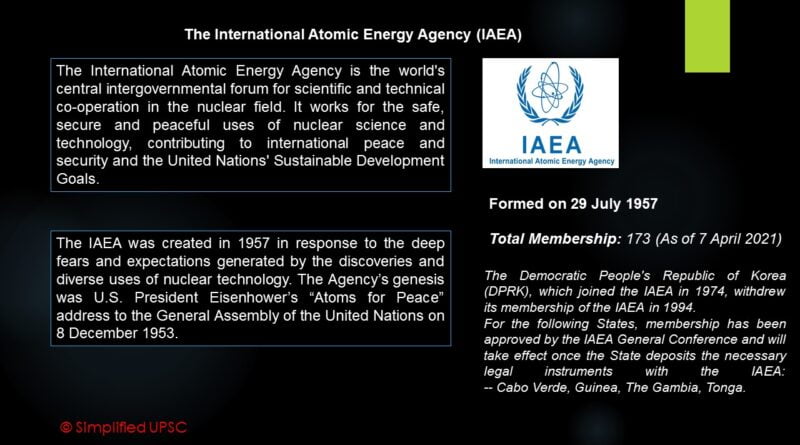International Atomic Energy Agency (IAEA)
Context:
IAEA Chief has said that a three-month “temporary solution” had been found to allow the agency’s monitoring in Iran to continue, although its level of access will be limited.
What’s the issue?
Iran’s conservative-dominated parliament passed a law in December demanding the country suspend some inspections if the US failed to lift sanctions. The law is due to go into effect on Tuesday.
Significance of the move:
This is an attempt by the U.S. President Joe Biden’s administration, European powers and Iran to rescue the 2015 nuclear deal that has been on the brink of collapse since former President Donald Trump withdrew from it.
About IAEA:
- The IAEA is an international organization that seeks to promote the peaceful use of nuclear energy and to inhibit its use for any military purpose, including nuclear weapons.
- The IAEA has its headquarters in Vienna, Austria. It was established as an autonomous organisation
- Form on 29 July 1957.
- Though established independently of the UN through its own international treaty, the IAEA reports to both the UN General Assembly and UN Security Council.
IAEA History and Origins
IAEA’s origins can be traced back to an address of the former US President Dwight Eisenhower to the General Assembly of the United Nations in 1953.
- The address was known as ‘Atoms for Peace’ and this was the organisation’s first name when it was formally established in 1957.
- Headquartered in Vienna, Austria, the IAEA is a UN agency.
- The primary mandate of the organisation was and continues to be promoting safe, secure and peaceful nuclear technologies.
- Currently, it has 171 members. The latest member is Saint Lucia which joined the IAEA in 2019.
- India became a member in 1957 itself.
- By ensuring the peaceful usage of nuclear technologies, the IAEA contributes to peace and security in the world and also towards achieving the Sustainable Development Goals (SDGs).
- The current Director-General of the organisation is Rafael Mariano Grossi.
- The IAEA, along with its former Director-General Mohamed ElBaradei, was awarded the Nobel Peace Prize in 2005.
- Although the IAEA is an independent international organisation, it reports annually to the UNGA.
- The IAEA has regional offices in Geneva, New York, Toronto and Tokyo; and research laboratories in Austria, Italy and Monaco.
Functions of IAEA
- The IAEA serves as an intergovernmental forum for scientific and technical co-operation in the peaceful use of nuclear technology and nuclear power worldwide.
- The programs of the IAEA encourage the development of the peaceful applications of nuclear energy, science and technology, provide international safeguards against misuse of nuclear technology and nuclear materials, and promote nuclear safety (including radiation protection) and nuclear security standards and their implementation.
The IAEA’s three chief areas of work are:
- Safety and security
- Science and technology
- Safeguards and verification
IAEA Governance
The IAEA has two policymaking bodies. They are:
- General Conference
- Board of Governors
General Conference
- It consists of all the member countries of the IAEA.
- It meets in a regular annual session.
- The annual general conference usually takes place in September.
64th General Conference of IAEA was held in Vienna from September 21st to 25th 2020.
Board of Governors
- Here, there are 35 members.
- The Board generally meets five times a year.
- It examines and makes recommendations to the IAEA’s General Conference on the organisation’s programme, financial statements and budget.
- The Board considers membership applications, approves safeguards agreements and the publication of the safety standards of the IAEA.
- It also appoints the Director-General of the IAEA, with the approval of the General Conference.
Secretariat
The IAEA also has a Secretariat which comprises the organisation’s professional and general service staff. It is headed by the Director-General.
Programs:
- Program of Action for Cancer Therapy (PACT).
- Human Health Program.
- Water Availability Enhancement Project.
- International Project on Innovative Nuclear Reactors and Fuel Cycles, 2000.
Source: The Hindu



